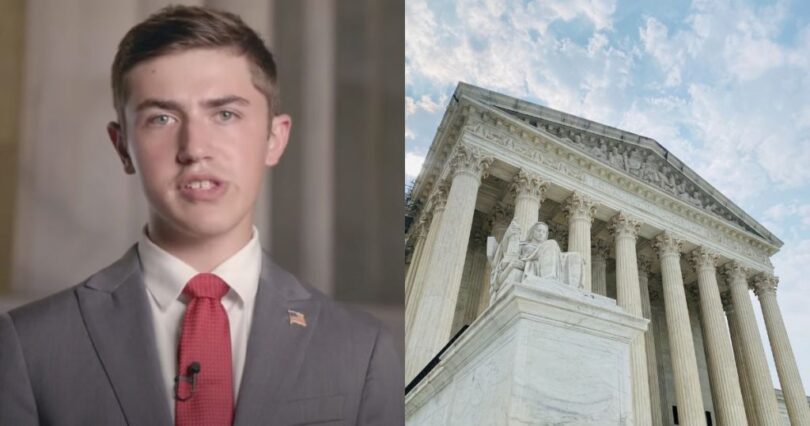Supreme Court Declines To Take Nicholas Sandmann’s Petition
The Supreme Court declined to take up the case of Nicholas Sandmann, the former Kentucky high school student and a supporter of Donald Trump who sued multiple news outlets for what he claimed was libelous coverage of his viral confrontation with a Native American activist in 2019.
Justices opted against hearing Sandmann’s petition against several outlets on Monday, including ABC News, The New York Times, Gannett, and others. This decision maintains the lower court’s dismissal of the extensive libel suit.
Sandmann filed a petition for a writ of certiorari in January, with media organizations subsequently waiving the right to respond the following month, according to the Supreme Court’s docket.
In the petition, Sandmann’s legal team argued against the U.S. Court of Appeals for the Sixth Circuit’s ruling, which concluded that media reports of Nathan Phillips’ account—that Sandmann had “blocked [his] way and wouldn’t allow [him] to retreat”—were “protected opinions.”
The widely circulated video depicted Sandmann, then a 16-year-old Covington Catholic High School student, facing off with Phillips at a Washington rally. The incident sparked allegations of racial motivation against Sandmann, which he denied. Phillips was participating in an “Indigenous People’s March,” while Sandmann was attending the “March for Life” event.
Sandmann initiated lawsuits against eight media organizations, seeking a total of $1.25 billion in damages for their coverage of the event. His legal counsel referred to Sandmann as a victim of “cancel culture” and depicted him as an “innocent high school student” at the time of the encounter with Phillips.
Sandmann faced condemnation from his church diocese, was denied re-admission to his high school, and became a subject of national media scrutiny, per the petition. He received round-the-clock police protection, with his image prominently featured across major television networks.
The Sixth Circuit’s 2-1 ruling last August deemed the “blocking” statements as “nonactionable,” as Phillips expressed “his subjective understanding of the situation and of Sandmann’s intent.” The court declined to rehear the case en banc in October.
In January, Sandmann argued to the Supreme Court that Phillips’ “sensory impressions” were reported by the media in “factual, descriptive terms,” rendering them false and libelous statements of fact.
Now, merely two months after the petition, the justices declined to hear the case without providing separate commentary on the denial.
Sandmann’s attorney, Todd McMurtry, expressed profound disappointment with the decision, emphasizing its implications for individual rights against defamation by mainstream media.
“As we reflect on the implications of the Supreme Court’s decision, let us keep sight of the broader conversation about justice, accountability, and the protection of individual rights,” McMurtry said. “We must continue this conversation with urgency and commitment for Nick and all Americans who deserve a legal system that serves justice equitably.”


Leave a Comment